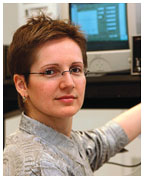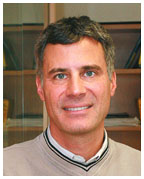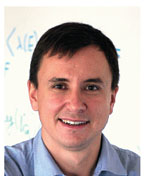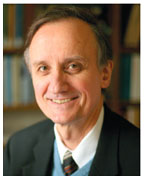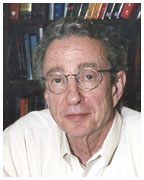
|
April 18, 2007: President's Page
THE ALUMNI WEEKLY PROVIDES THESE PAGES TO THE PRESIDENT
Claire Gmachl
Alan B. Krueger
Andrei Okounkov
Peter Schäfer
C. K. Williams |
Princeton’s world-class reputation in higher education rests in large part on the extraordinary quality of her faculty. From John Witherspoon in the 18th century, to the great physicist Joseph Henry in the 19th, to the celebrated literary critic Carlos Baker *40 in the 20th, Princeton’s faculty are the magnets that draw each year to campus the most talented students in the world. The scientific and scholarly distinction of our faculty is evident in their books published by the best university presses, their publications in prestigious journals, the major research grants that they successfully compete for, and, last but not least, in their selection for national and international awards. Spanning every discipline, these honors are both a form of public recognition and a source of practical support. In this column I have taken the opportunity to give you a sampling of the faculty who have won awards in the last two years and a taste, at least, of their remarkable accomplishments.
Claire Gmachl, an Associate Professor of Electrical Engineering and one of Princeton’s rising stars, was awarded a MacArthur Fellowship, popularly known as a “genius grant,” in the fall of 2005 by the John D. and Catherine T. MacArthur Foundation. First conferred in 1981, these five-year $500,000 fellowships are presented to “talented individuals who have shown extraordinary originality and dedication in their creative pursuits and a marked capacity for self-direction.” Awards are made to individuals in all areas of human endeavor—Professor Gmachl is the fourth member of our faculty to be so honored in the last six years—and come with no restrictions or requirements, giving MacArthur Fellows unlimited freedom to pursue the subjects closest to their hearts. In Professor Gmachl’s case, this involves the development of quantum cascade lasers, a high-performance and exceptionally versatile semiconductor light source with a wide range of applications—from detecting diseases to sensing explosives to enhancing wireless communication. Bridging fundamental physics and applied technology, she has significantly advanced the frontiers of laser design and the broader field of optoelectronics, first at Bell Laboratories and, since 2003, at Princeton.
In announcing her award, the MacArthur Foundation praised the lasers that she and her colleagues have developed for their “seemingly unlimited design potential,” but it is her underlying creativity, her desire to go where no engineer has gone before, that makes her such a fitting choice for a MacArthur Fellowship. Peter Ramadge, who chairs our Department of Electrical Engineering, put it well when he wrote, “Claire embodies the most desirable aspects of a dedicated scholar and teacher: a brilliant mind, a dedication to pursuing deep and difficult research, and the enthusiasm and energy to share her knowledge with her colleagues and with Princeton’s undergraduate and graduate students. She also has the imagination and insight to see beyond the ordinary; and the skill, enthusiasm, and dedication to bring her ideas to reality.”
Alan B. Krueger, the Bendheim Professor in Economics and Public Policy, was awarded the IZA Prize in Labor Economics by Germany’s Institute for the Study of Labor last fall. Together with co-winner and former Princeton Professor of Economics David Card *83, Professor Krueger was honored for a multifaceted body of work that has, in the words of the IZA Prize Committee, “crucially shaped the research agenda in labor economics and has certainly raised the standards for empirical research in applied economics.” First awarded in 2002, the annual IZA Prize is intended to reward and encourage research that addresses questions of importance to the world’s labor markets. Princeton faculty have a long tradition of shaping the field of empirical labor economics—going back at least to the founding of the Industrial Relations Section in 1922—and Professor Krueger, like his colleague and previous IZA Prize recipient Orley Ashenfelter *70, is an outstanding member of this company.
As the IZA Prize Committee noted, Professor Krueger is an original thinker who has challenged conventional wisdom and well-established economic models through the skillful use of “natural experiments” and sophisticated econometric methods. Since joining our faculty in 1987, his work has shed important light on many issues of public policy concern, influencing national discussions on subjects ranging from the impact of minimum wage increases on employment levels to the relationship between school quality and students’ future earnings. His work, which, as departmental chair Bo Honoré points out, extends far beyond the confines of labor economics, has also underscored the importance of grounding these discussions in empirical research that is at once creative and rigorous—an approach that has served as a model for his peers. Whether he is focusing on the economics of the workplace or probing the world of “rockonomics,” better known as popular music, Professor Krueger has shown an intellectual curiosity, a methodological discipline, and a commitment to uncovering the truth that have placed him in the forefront of his field.
Andrei Okounkov, a Professor of Mathematics at Princeton since 2002, was presented with his discipline’s highest honor in Madrid last summer. The Fields Medal is regarded as the Nobel Prize of mathematics and is awarded every four years by the International Mathematical Union to between two and four mathematicians under the age of 40 who have made—and give every promise of making—an outstanding contribution to their field. Professor Okounkov joins a small but brilliant constellation of mathematicians who have been accorded this honor since 1936. He is the second member of our current mathematics faculty to be so recognized, joining Charles Fefferman *69, who received the Fields Medal in 1978 for his contributions to multidimensional complex analysis. Professor Okounkov, a native of Moscow who earned a doctorate in mathematics in Russia before moving to this country, was praised by the Fields Medal Committee for producing work that “has revealed profound new connections between different areas of mathematics and has brought new insights into problems arising in physics.”
Much of this work has been jointly undertaken with fellow Princeton mathematician Rahul Pandharipande ’90, and this collaborative spirit has helped Professor Okounkov to build many intellectual bridges since joining our faculty, not only within his discipline but also between mathematics and physics. For example, the insights he has brought to the study of algebraic curves have significant implications for both pure algebraic geometry and its applications, such as in statistical mechanics. In the words of his departmental chair, Andrew Wiles, “Andrei is a superb example of a modern mathematician. He is interested and active in many different fields and brings his great breadth and scholarship to bear on some very classical problems. . . . It often takes great ingenuity and skill to turn these ideas into proofs but Andrei is a master at this. He brings his enthusiasm and his critical judgment to bear on a whole range of departmental activities and research projects, and this energy makes him a wonderful colleague and a unique mathematical catalyst.”
Peter Schäfer, the Ronald O. Perelman Professor of Jewish Studies and a member of our faculty since 1998, received one of four Andrew W. Mellon Foundation Distinguished Achievement Awards last fall in recognition of his far-reaching contributions to the field of Judaic studies and an array of related disciplines. Established in 2001, the Mellon Distinguished Achievement Awards are designed not only to honor eminent scholars in the humanities but also to strengthen humanistic studies at the institutions with which they are affiliated. Professor Schäfer joins Professors of History Anthony Grafton and Peter Brown, Professor of Philosophy and Comparative Literature Alexander Nehamas *71, and Professor of Near Eastern Studies Michael Cook as the fifth member of our faculty to win this award, a remarkable testament to Princeton’s distinction in the humanities. Indeed, our faculty has received five of the 26 Mellon Distinguished Achievement awards conferred since 2001.
Professor Schäfer, who directs our Program in Judaic Studies and formerly headed the Institute for Judaic Studies in Berlin, is an inspired choice for this award, given his strong commitment to interdisciplinarity and the creation of intellectual resources that will benefit the academic community, such as scholarly editions of important primary texts and the Jewish Studies Quarterly, of which he is a founding editor. The author of numerous books on topics ranging from early Jewish mysticism to the place of Jesus in the Talmud, he has both broadened and deepened the study of Jewish faith and culture and the faiths and cultures with which Judaism has historically interacted. In the words of Leigh Schmidt, chair of our Department of Religion, “The Mellon Distinguished Achievement Award is apt recognition of the originality and fecundity of his scholarship, testimony anew to his consummate role in the study of rabbinic Judaism as well as to his profound intellectual reach across a vast sweep of Western religious and intellectual history. To my mind, Peter has always embodied our department’s double vibrancy—its warm collegiality and intellectual rigor—to a particularly high degree.”
C. K. Williams, a lecturer with the rank of professor in the University Center for the Creative and Performing Arts and Program in Creative Writing and one of the most accomplished poets of our time, was awarded the Ruth Lilly Poetry Prize in the spring of 2005—the second member of our faculty in recent years to be so honored. Inaugurated in 1986 and administered by the Poetry Foundation, this annual award is conferred on American poets “whose lifetime accomplishments warrant extraordinary recognition.” Professor Williams, whose previous honors include a Pulitzer Prize and National Book Award, was cited by Poetry Foundation president John Barr for crafting poems that represent “a joint venture between place . . . and the state of mind observing the place,” a collaboration that “brings us to a more nuanced understanding of what it is to be human.”
Since 1995, Professor Williams has introduced our students to the power and constraints of poetry and the delicate art of translation and dramatic adaptation, drawing on his own work that is famed for its moral integrity, raw immediacy and vehemence, and lines whose uncommon length allows him to speak expansively instead of in poetic “code.” His newly published 682-page Collected Poems spans more than 35 years of poetry, from youthful outrage at Vietnam-era politics to the measured but equally compelling contemplations of a man with grandchildren.
One of the best summations of his contributions to the world of poetry comes from the pen of fellow poet Paul Muldoon, chair of the University Center for the Creative and Performing Arts. “The extraordinary thing about C. K. Williams has been his constancy to the idea of change. Over the course of a long career, he has been able to remake himself from book to book, just as the hydrogen atoms in a human body remake themselves every seven years. Each poem, however, is shot through with his genetic material. Each bespeaks a profound sense of inventiveness and an even more profound sense of inevitability.”
As extraordinary as these five individuals are, they are just a few
of Princeton’s award-winning faculty. Their keen minds and dedication
to their work have made our University community a more stimulating place
for all who teach and study here.
![]()


